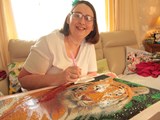The benefits of flexible working and why Ategi is a great place to work
by Ruth Smith, Ategi's Head of Human Resources and Organisational Development
The recent pandemic has changed the working landscape forever, it created a huge amount of problems, but with those problems also came opportunities. The Covid-19 pandemic has led to a significant increase in flexible working practices around the world. Post-pandemic, a light was shone on how employees and employers could navigate a move to different types of working with a focus on well-being and ensuring a positive work-life balance.
Many employers and staff had to think ‘outside the box’ in how they could work differently and this resulted in flexible ways of working being explored and adopted. The need for a dynamic approach to the changing landscape of the workplace wasn’t just advisable, it was a necessity, even post-pandemic, the need for a flexible approach to working lives on. According to an Economist report, 59% of people say they would consider taking a job with a company that offers better well-being benefits than their current employer.
What is flexible working?
Flexible working refers to any work arrangement that allows employees to have greater control over when, where, and how they work. The benefits of flexible working can be numerous and significant, both for employees and employers.
Here are some of the most important benefits of flexible working:
- Improved work-life balance: Flexible working allows employees to better balance their work and personal life. It can make it easier for them to schedule appointments, attend to family responsibilities, and pursue hobbies or interests outside of work.
- Increased productivity: When employees are able to work in an environment that suits their needs, they are likely to be more productive. They can choose to work during their most productive hours and in a location that enables them to focus and be efficient.
- Greater job satisfaction: Employees who have more control over their working hours and location tend to be happier and more engaged in their work. They also feel valued and trusted by their employer, which can lead to higher retention rates.
- Better health and well-being: Flexible working can reduce stress and anxiety associated with long commutes and rigid work schedules. It can also enable employees to take care of their physical and mental health by allowing them to schedule exercise and other self-care activities.
Overall, flexible working can improve employee morale, productivity, and retention rates and create a workplace that prioritises people’s lives outside of work.
Now that we are no longer restricted in the ways we work, or our ways of thinking, we can explore and adopt new patterns.
Ategi were quick to respond to this new way of working and were early adopters of the flexible working approach as this aligned with our values of being 'kind' and our strategic objective of being 'a great place to work'. We have broadened our ways of thinking and approaching work patterns, many staff are now combining office bases with home bases in our hybrid working patterns. However, we have continued to look at how we can be more agile and are now pleased to add a 9-day working fortnight as an option for flexible working.
Benefits of a 9-day working fortnight
A 9-day working fortnight is a work arrangement where an employee works for nine days and then has a day off, and this cycle is repeated every two weeks. This arrangement can have several benefits, including:
- Improved work-life balance: With a 9-day working fortnight, employees have an extra day off every two weeks, which can allow them to better balance their work and personal life. This can lead to reduced stress and increased job satisfaction.
- Increased productivity: Longer work hours in a day allow for fewer disruptions, which can lead to increased productivity. Additionally, with an extra day off every two weeks, employees can return to work feeling refreshed and energised.
- Cost savings: A 9-day working fortnight can reduce commuting costs, as employees are working fewer days in a two-week period.
- Better health: With an extra day off every two weeks, employees have more time to attend to their physical and mental health needs, such as exercise, medical appointments, and spending time with family and friends. This can lead to improved overall health and well-being.
- Improved employee retention: Offering a 9-day working fortnight can be an attractive benefit for employees, which can lead to increased retention rates. Employees may be more likely to stay with a company that offers a flexible and accommodating work schedule.
Overall, a 9-day working fortnight can be a win-win for both employers and employees, leading to improved work-life balance, productivity, health and wellbeing and retention rates.
As of April 1st, the 9-day working fortnight is open to all Ategi staff working 30 hours or more over 5 days. It will enable our eligible employees to compress their contracted hours into 9 instead of 10 days working over a two week period and enable an additional day to be spent how you wish.
If you're already one of Ategi's staff you can find out how this can benefit you by talking to your line manager or HR, if you're someone looking to join the Ategi team, you can check out our vacancies below.
Explore Ategi's current vacancies here
Post-pandemic a light was shone on how employees and employers could navigate a move to different types of working with a focus on well-being and ensuring a positive work-life balance.

Ategi were quick to respond to this new way of working and were early adopters of the flexible working approach as this aligned with our values of being kind and our strategic objective of being a great place to work.











About the author
Ruth Smith
Ruth is Ategi's Head of Human Resources and Organisational Design. She has been working in the field of human resources for over 30 years, and until she joined Ategi, her experience had been in the retail and the hospitality sectors.